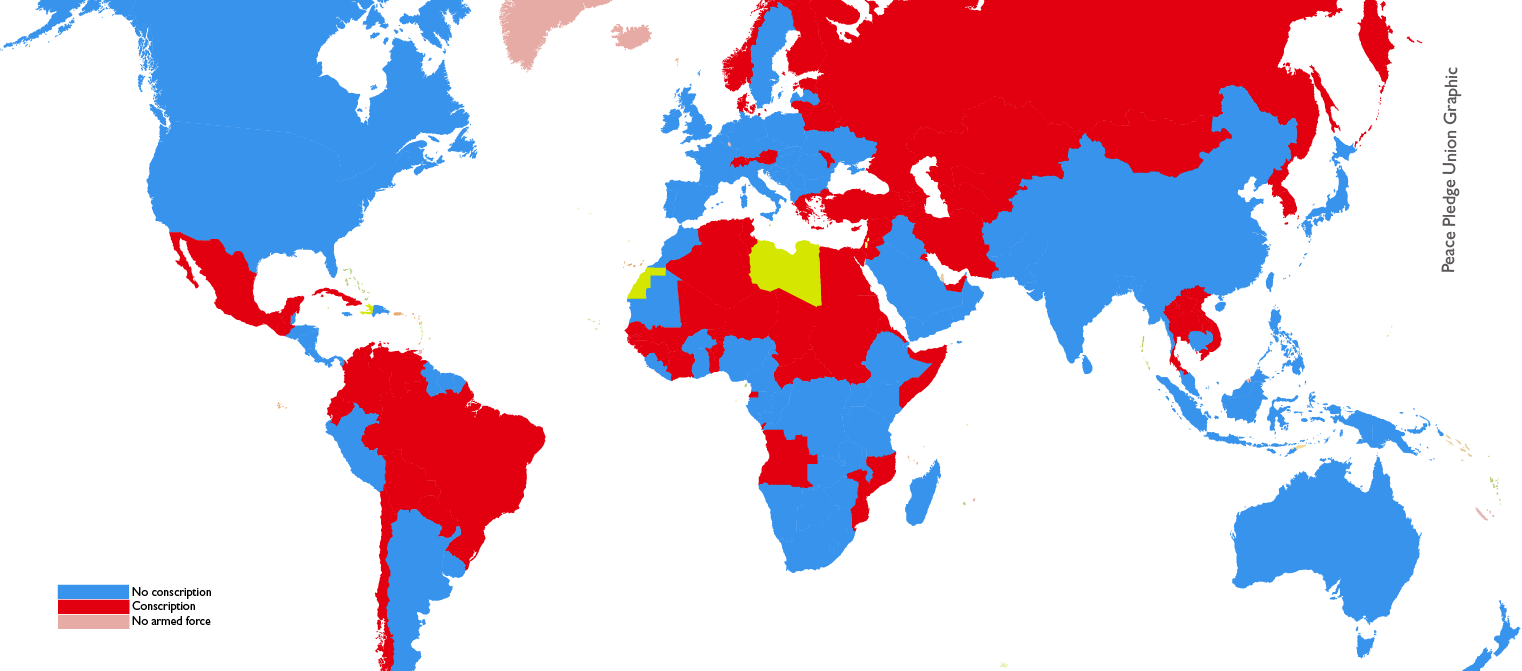Many countries still fail to recognise people’s right to refuse, because of moral, political or religious convictions, to work in armed forces. Here are stories from some of these countries.
ARMENIA
Jehovah’s Witnesses are forbidden by their religion to serve in an army or carry weapons. It was not until 2004 that the Armenian government introduced a law for conscientious objection, entailing a requirement for alternative civilian service. Until then Jehovah’s Witnesses who refused call-up were described as ‘evaders of active military service’ and could be prosecuted in a criminal court, with a penalty of up to three years in prison. Though they had the chance to put their case in court, and in a court of appeal, most were sentenced to a year or more in prison, having already spent a long time in prison waiting for their case to come up. Some served longer sentences, often in labour camps. Even after the law allowing for alternative service, arrests for ‘draft-dodging’ were still being made, and many who were already in prison had not been freed.
Eventually in 2011, in a ground-breaking case brought by an Armenian conscientious objector, the Grand Chamber (the highest level) of the European Court of Human Rights (an agency of the Council of Europe, separate from the European Union) ruled that, in the case of states signatory to the European Convention on Human Rights and exercising powers of military conscription, provision for conscientious objection was now an essential prerequisite, in accordance with the freedom of conscience enshrined in the Convention. The Court took into account that “there exist effective alternatives capable of accommodating the competing interests involved in the overwhelming majority of European states”. | Outside link
ERITREA
The law provides that men and women aged 18-40 must serve 18 months in the military, though the term often ends up much longer. There is no right to conscientious objection. The government has deployed military police throughout the country using roadblocks, street sweeps, and house-to-house searches to find deserters and draft evaders; Amnesty International reported in 2004 that since 1998 the Eritrean military had arrested thousands of young men and others, and arrests had recently been stepped up. ‘Soldiers go into offices, houses, stop cars, taxis, buses, and ask for identity cards,’ said one young man. Many young people have fled from the country as refugees to avoid conscription.
The report described how some objectors were in military prison; conditions were harsh, with severe overcrowding, insufficient food and little sanitation. Some had been forced to sleep outside in very cold weather, without blankets or shoes. Prisoners had no access to their families or lawyers.
There were also reports that the army has used severe physical punishment to force objectors, including Jehovah's Witnesses, to perform military service. Three men have now been in prison continuously since 1994. In some instances, authorities have detained (for hours or even days) a number of people, including pregnant women, children under 18, and citizens of other countries – even though they were not liable for call-up, and even if they had documents proving they had already completed military service or were exempt from it. | Outside link
FINLAND
Compulsory military service lasts for up to a year. The law requires that anyone who refuses to do military service must do alternative civilian service, but alternative service lasts twice as long, amounting to a form of punishment. Conscientious objectors refusing to do alternative service have been sent to prison.
GREECE
Men are required to perform a year’s military service. The right to conscientious objection was not recognised until 1997.
The case of one conscientious objector caused War Resisters’ International to launch a campaign to support him. He first declared himself a CO in 1992. In the following years he was taken to court twelve times and imprisoned three times. In 1998 he applied for status as a CO under the new 1997 law,, but although he was accepted as a CO, he was still called up for alternative service – for a term more than seven times longer than his military service would have been. He refused to do alternative service. In 1999 he was arrested again and sentenced to four years in prison. He appealed against the sentence, which was eventually suspended. But then he was called up again. In 2004 he was once more arrested, tried and sentenced to two and a half years in prison. Campaigners pointed out that he had now been tried and punished twice for essentially the same ‘offence.
In 2014 a conscientious objector filed a case with the European Court of Human Rights against the refusal of the government to recognise hic conscientious objection; It will be a considerable time before judgement is given. | Outside link
ISRAEL
Military service is compulsory for men, and can last up to three years. Service of up to two years is also compulsory for women unless they have married before call-up age. Men and women belonging to certain ethnic and religious groups are exempt from call-up.
Israel’s ‘refuseniks’ – soldiers who have refused to obey orders to harass or kill Palestinian civilians – have become famous. A few have managed to obtain exemption from military service on convincing the military authorities that they were pacifists. The majority of refuseniks are not pacifists, and suffer repeated imprisonment.
In the case of women, Israel’s conscription law allows exemption to those who are pacifists or who have a strict ‘religious family lifestyle’. But in practice being a pacifist (but not committed to a religious life) has not been enough for the military courts to agree to grant exemption. | Outside link
RUSSIAN FEDERATION
Men are required to serve two years in the armed forces. A law allowing for conscientious objection came into operation on 1 January 2004. According to this law, alternative civilian service lasts much longer: three and a half years A further problem is finding jobs for them to do. Some have been doing welfare work, in nursing homes and the like, but others have been sent to military construction sites and factories, which obviously is not civilian service. | Outside link
SOUTH KOREA
Compulsory military service is for two years. The Korean Supreme Court and the Constitutional Court have denied that conscientious objection is a human right, and say that ‘national security’ is in any case more important than an individual’s human rights. COs are regularly arrested and imprisoned. Some object to call-up because of their Buddhist religion. Some have objected in particular to the deployment of South Korean troops in Iraq. Yet others are pacifists, and some of these are active protesters in the pacifist cause, working with organisations such as War Resisters’ International and Amnesty International, or in liberal political groups, or through publications and the press. Some have protested by going on hunger strike.
One conscript who declared his conscientious objection to taking part in the war in Iraq was arrested at the end of 2003. His defence was that the South Korean constitution banned wars of aggression. The judge told him that the USA was friendly towards South Korea and therefore must be supported in every way. The CO was sentenced to two years in prison, later shortened by six months.
Since 2006 the UN Human Rights Committee has issued five Views faulting the government of South Korea for its failure to adopt legislation to protect the right to conscientious objection and for punishing those who claim the right. The Committee’s latest report in 2015 again urged the government to “establish mechanisms and appropriate procedures to give full effect to the Committee’s Views,” including the full implementation of the Views the Committee has already issued.
Following the release of the report, Seong-ho Lee, chairman of the National Human Rights Commission of Korea, acknowledged the human rights violations identified in the report. In a public statement advising the government to implement the Committee’s recommendations, Mr. Lee concluded: “The government is responsible for fully implementing the ICCPR [International Covenant on Civil and Political Rights].” | Outside link
SWITZERLAND
Switzerland, committed to neutrality since 1815, has an army 200,000 strong. Military service is compulsory for men and lasts nearly a year; women can volunteer for the same training. A law on conscientious objection was passed in 1992, but allows very few reasons for claiming conscientious objection. If accepted, conscientious objectors are required to do 450 days of civilian service – much longer than military service. COs who refuse alternative service have been imprisoned. This has meant that some COs have not tried to apply for CO status, but have found other means of evasion, such medical grounds, or behaviour leading to dismissal from military training.
TURKEY
Military service is compulsory for almost all men between the ages of 20 and 40, and lasts for at least six months. Refusing to serve has been illegal, punishable by imprisonment. Conscientious objection has not been accepted. There have been grim reports of harsh prison conditions and even torture.
In 2006 the European Court of Human Rights ruled that a conscientious objector who had undergone repeated prosecutions and imprisonments for refusing to wear military uniform had suffered inhuman and degrading treatment contrary to the European Convention on Human Rights. “The constant alternation between prosecutions and terms of imprisonment, together with the possibility that the applicant would be liable to prosecution for the rest of his life, had been disproportionate to the aim of ensuring that he did his military service.”In a further case in 2011 the court ruled that similar treatment of a conscientious objector was contrary to the Convention’s guarantee of freedom of conscience, The Turkish administrative system for dealing with COs “failed to strike a fair balance between the interests of society as a whole and those of conscientious objectors”.
In 2012 the UN Human Rights Committee ruled against Turkey in an application made by two conscientious objectors denied exemption from military service.
The Turkish government has persistently ignored these rulings, continuing to treat the growing number of conscientious objectors in the same way. Amnesty International and War Resisters’ International have urged worldwide support for Turkish COs. Outside link
|
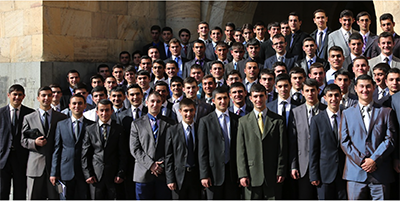 Armenian conscientious objectors Armenian conscientious objectors
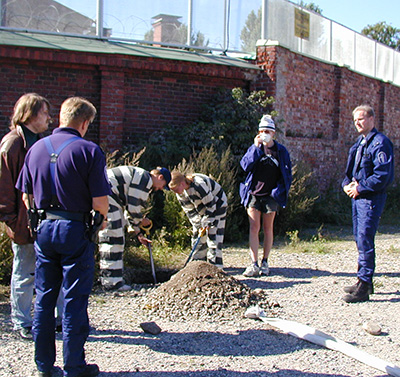
Finnish campaigners ‘attempting’ to dig their way into the jail where fellow CO are incarcerated.
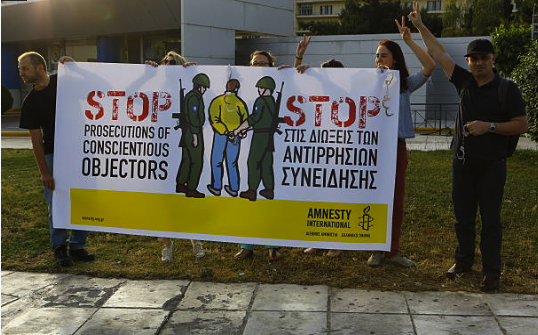
Protest in Athens
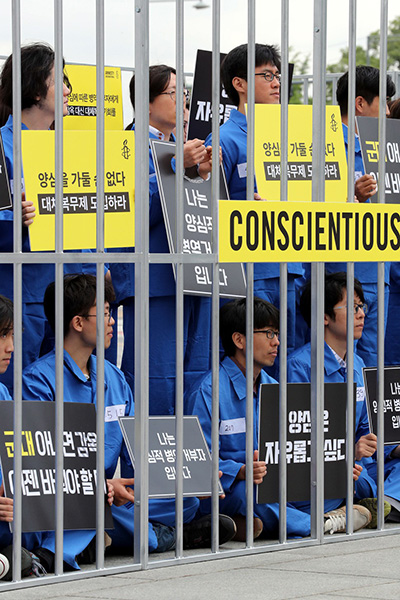
Protest for the right of conscientious objection in Seoul
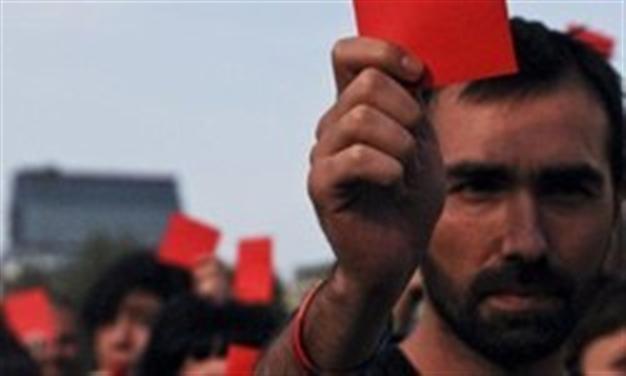
Conscientious objector Mehmet Tarhan convicted by Turkish military court and sentencd to fifteen months. |
